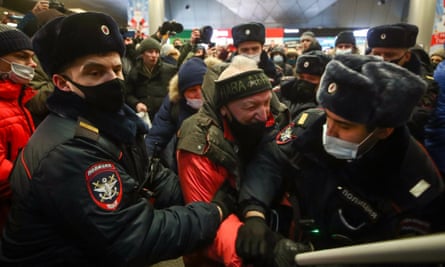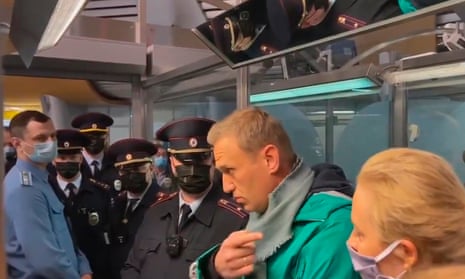A judge in Moscow has ordered that Alexei Navalny be held in custody for 30 days until a parole review that could imprison him for years, as Russia defied international pressure to release the Kremlin critic.
Despite international outcry led by US and European leaders and joined by activists including Edward Snowden, a Russian resident, the Kremlin has moved forward with the legal framework it would need to send one of Vladimir Putin’s most tenacious opponents to a penal colony by the end of the month.
In response, Navalny has called for mass protests this Saturday. “There’s nothing these thieves in their bunkers fear more than people on the streets,” he said from a Moscow courtroom. The size of those protests could determine whether or not the Putin critic is freed or given a long prison sentence.
The sequence of events has seemed all but certain since Navalny said he would return home, challenging the Kremlin just five months after barely surviving a suspected FSB poisoning attempt on his life.
Ahead of his trip, prison officials threatened to reverse an old three-and-a-half-year suspended sentence on embezzlement charges, turning it into real jail time without the trouble of a new trial. That decision is scheduled for 29 January.
The incoming US administration was quick to condemn the arrest, suggesting human rights will return to the agenda with Moscow when Donald Trump leaves the White House this week.
Joe Biden’s incoming national security adviser, Jake Sullivan, called for Navalny’s immediate release, adding that the “perpetrators of the outrageous attack on his life must be held accountable”. His remarks came hours before Mike Pompeo, the secretary of state, registered his complaint.
@Navalny's arrest seems to me a repetition of mistakes made in the Soviet era, seen elsewhere now in the case against #Assange and the war on whistleblowers. States are developing an allergy to opposition—but systems that cannot accept dissent will not survive it. Let him go.
— Edward Snowden (@Snowden) January 17, 2021
But with an eye to the recent tumult in the US, the Kremlin delivered a swift message to its critics abroad. “Deal with the problems in your own country,” a foreign ministry spokesperson wrote in remarks directed at Sullivan. Threats of sanctions and notes of caution from UK and other European leaders were met with similar disdain.
The British Foreign Office said it was “deeply concerned … Instead of persecuting the victim of this terrible crime, the Russian authorities should investigate how a chemical weapon came to be used on Russian soil.” Snowden, the NSA whistleblower, who lives in Russia, tweeted in support of Navalny, calling his arrest a “repetition of mistakes made in the Soviet era”.
The court’s procedure made little sense. One night after being arrested at the border and kissing his wife goodbye, Navalny was hustled into a hastily convened court hearing held inside a police station, where a judge announced that a police chief wanted him held for 30 days.
His lawyers said they had one minute’s warning before the hearing began. Independent journalists were cleared from the room. On the wall behind Navalny hung a poster of Genrikh Yagoda, a secret police head under Stalin who organised show trials and set up the gulags, or prison camps.
“I have no idea what’s going on,” Navalny said in an impassioned speech. “This is lawlessness of the highest order.”
Outside the police station, up to 100 of his supporters chanted, “Putin is a thief!”, a slogan that Navalny has popularised in his decade of attacks on the Russian leader, his family and entourage, and the system he has built.

From his early days as an openly nationalist politician and Livejournal blogger, Navalny has built a powerful operation that consists of a guerrilla newsroom, a campaign strategy headquarters and an investigative journalism outfit that has become a major headache for the Kremlin.
His investigations into corrupt officials, many of them with ties to Putin, as well as into his own poisoning at the hands of an apparent FSB hit squad, can receive tens of millions of YouTube views.
But he remains a polarising figure who lacks the widespread support to allow him to face the Kremlin head on, and the authorities may hope that Russians will be ready to cheer on or at least ignore his case if they decide to throw the book at him.
Largely barred from television, the place where most Russians get their news, he is portrayed there as either a dangerous revolutionary or an insignificant blogger, a status belied by the rows of riot police with helmets deployed to Moscow airports before his arrest on Sunday evening.
Later that night, Dmitry Kiselyov, the host of a weekly news show on Russian state television, compared Navalny’s return from Germany to Vladimir Lenin’s journey aboard a sealed train in 1917 in what he called a “revolutionary landing force”.
Throughout the ordeal, the Kremlin has kept quiet. Putin never refers to Navalny by name, only recently referring to him as the “German patient” in order to suggest that he was backed by western intelligence agencies. His spokesman, Dmitry Peskov, claimed on Sunday evening that he hadn’t heard that Navalny had been detained. “Please explain. He was arrested in Germany? I’m not following,” he told Russian journalists.
